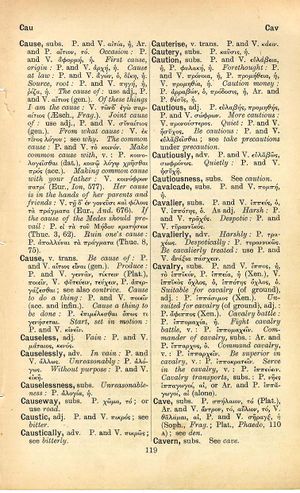cause
τὸ γὰρ πράττειν τοῦ λέγειν καὶ χειροτονεῖν ὕστερον ὂν τῇ τάξει, πρότερον τῇ δυνάμει καὶ κρεῖττόν ἐστιν (Demosthenes 3.15) → for action, even though posterior in the order of events to speaking and voting, is prior in importance and superior
English > Greek (Woodhouse)
subs.
P. and V. αἰτία, ἡ, Ar. and P. αἴτιον, τό.
Occasion: P. and V. ἀφορμή, ἡ.
First cause, origin: P. and V. ἀρχή, ἡ.
Cause at law: P. and V. ἀγών, ὁ, δίκη, ἡ.
Source, root: P. and V. πηγή, ἡ, ῥίζα, ἡ.
The cause of: use adj., P. and V. αἴτιος (gen.).
Of these things I am the cause: V. τῶνδʼ ἐγὼ παραίτιος (Aesch., Frag.).
Joint cause of: use adj.: P. and V. συναίτιος (gen.).
From what cause: V. ἐκ τίνος λόγου; see why.
The common cause: P. and V. τὸ κοινόν.
Make common cause with, v.: P. κοινολογεῖσθαι (dat.), κοινῷ λόγῳ χρῆσθαι πρός (acc.).
Making common cause with your father: V. κοινόφρων πατρί (Eur., Ion, 577).
Her cause is in the hands of her parents and friends: V. τῇ δʼ ἐν γονεῦσι καὶ φίλοις τὰ πράγματα (Eur., And. 676).
If the cause of the Medes should prevail: P. εἰ τὰ τοῦ Μήδου κρατήσειε (Thuc. 3, 62).
Ruin one's cause: P. ἀπολλύναι τὰ πράγματα (Thuc. 8, 75).
v. trans.
Be cause of: P. and V. αἴτιος εἶναι (gen.).
Produce: P. and V. γεννᾶν, τίκτειν (Plat.), ποιεῖν, V. φυτεύειν, τεύχειν, P. ἀπεργάζεσθαι; see also contrive.
Cause to do a thing: P. and V. ποιεῖν (acc. and infin.).
Cause a thing to be done: P. ἐπιμέλεσθαι ὅπως τι γενήσεται.
Start, set in motion: P. and V. κινεῖν.

